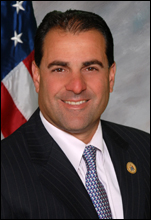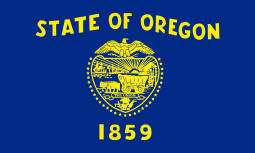An MGM Resorts International executive with whom I spoke yesterday told me the New Jersey casino ballot initiative is trailing badly in the polls. We hope he’s right, especially as news of the closure of Trump Taj Mahal (and Glenn Straub‘s pratfalls at Revel) is bound to sow new doubts about the viability of Atlantic City. “The news of the Taj Mahal closing is  tragic, and it just magnifies the importance of defeating this referendum,” said opposition leader Debra DiLorenzo, who predicts that as many as five Boardwalk casinos could close if the referendum passes. Would-be megaresort developer Jeff Gural argues counterintuitively that passage of the referendum would help Atlantic City. He was echoed by state Sen. Paul Sarlo (D, left), whose constituents include the casino-hungry Meadowlands. “The pending closure of the Trump Taj Mahal should serve as a wake-up call for Atlantic City officials to take advantage of the benefits of casino expansion. Expanding New Jersey’s gaming sector to North Jersey will provide financial resources so that Atlantic City can invest in economic expansion. The city has the opportunity and the ability to become a destination resort that doesn’t rely on casinos alone,” Sarlo said.
tragic, and it just magnifies the importance of defeating this referendum,” said opposition leader Debra DiLorenzo, who predicts that as many as five Boardwalk casinos could close if the referendum passes. Would-be megaresort developer Jeff Gural argues counterintuitively that passage of the referendum would help Atlantic City. He was echoed by state Sen. Paul Sarlo (D, left), whose constituents include the casino-hungry Meadowlands. “The pending closure of the Trump Taj Mahal should serve as a wake-up call for Atlantic City officials to take advantage of the benefits of casino expansion. Expanding New Jersey’s gaming sector to North Jersey will provide financial resources so that Atlantic City can invest in economic expansion. The city has the opportunity and the ability to become a destination resort that doesn’t rely on casinos alone,” Sarlo said.
Another player in the debate has emerged in the form of lobbying group Trenton’s Bad Bet. Little is known about the organization but it has already drawn the support of Unite-Here Local 54 President Robert McDevitt. Said Bad Bet Executive Director Bill Cortese, “We … want to make sure residents have a voice in this process. So far very little information has been shared—a typical play by Trenton politicians when they want to move something through the back door.”
What Carl Icahn loses from one hand, by closing the Taj, he gains in the other, according to Moody’s Investors Service, which predicts improved business at the Tropicana Atlantic City. Another beneficiary is expected to be Caesars Entertainment, which should see improved foot traffic at Caesars Atlantic City and Bally’s Wild Wild West.
To the northwest, in New York State, an attempt to get a question onto the November ballot barring gambling in Rochester went into the shredder. Although the city has been in talks with the Seneca Nation about a combined slot parlor and concert hall (an odd hybrid), it was deemed that tribal gaming was primarily the province of the federal government and, furthermore, that the petition’s language was faulty. “The law itself would not be valid, even if it was adopted either by the City Council or the voters,” said city counsel Brian Curran.
Pending qualification of the ballot question, Oregon voters may get the chance to vote on what would be the state’s first private-sector casino. However, perhaps because it is relatively late in the election cycle, developers Matt Rossman and Bruce Studer might  not go forward this year. The duo have optioned five acres in Wood Village and claim to have the mayor’s support. Rossman and Studer are nothing if not resilient: Attempts to have casino gambling approved at defunct Multnomah Greyhound Park met with defeats in 2010 and 2012 that were described as “crushing.” The track is no longer in play as a casino site, since it being demolished for a hotel by the Grande Ronde Tribal Confederation. Owners of a casino themselves, the Grande Ronde have persistently fought off Rossman and Studer. Rossman’s rationale for trying a third time to get a casino approved is that the Cowlitz Tribe is building one in a nearby town. However, if the threat is as real as Rossman says, it doesn’t explain his diffidence toward getting onto the 2016 ballot.
not go forward this year. The duo have optioned five acres in Wood Village and claim to have the mayor’s support. Rossman and Studer are nothing if not resilient: Attempts to have casino gambling approved at defunct Multnomah Greyhound Park met with defeats in 2010 and 2012 that were described as “crushing.” The track is no longer in play as a casino site, since it being demolished for a hotel by the Grande Ronde Tribal Confederation. Owners of a casino themselves, the Grande Ronde have persistently fought off Rossman and Studer. Rossman’s rationale for trying a third time to get a casino approved is that the Cowlitz Tribe is building one in a nearby town. However, if the threat is as real as Rossman says, it doesn’t explain his diffidence toward getting onto the 2016 ballot.
* Bradley International Airport, near Hartford, is making a serious push to be the site for the proposed Mohegan Sun/Foxwoods satellite casino. One of several proposals put forward would have gambling areas both within and without the security perimeter, and a rooftop casino where patrons could watch the planes, suggesting it’s an ‘extremely important component of the overall entertainment experience.'” MGM Resorts  was not amused, with Connecticut envoy Alan Feldman remarking tartly that “Calling this a ‘satellite casino’ — which is how they all referred to this in public — is like calling the Grand Canyon a hole in the ground.” MGM obtained the pertinent documents through a Freedom of Information Act request and leaked them to the media. Both a selectman from the town of Windsor Locks and Connecticut Airport Authority Executive Director Kevin Dillon disavowed MGM’s contentions, with Dillon lashing back at Feldman. MGM’s full-court press, he said, “completely mischaracterizes the Connecticut Airport Authority’s proposal for casino development at Bradley International Airport. This desperate attempt at fear-mongering is just another chapter in MGM’s increasingly alarming track record of distorting the truth to protect its business interests and maximize its financial gain at the expense of the CAA.” The satellite-casino proposal has been so contentious it has left little besides scorched earth in its trail.
was not amused, with Connecticut envoy Alan Feldman remarking tartly that “Calling this a ‘satellite casino’ — which is how they all referred to this in public — is like calling the Grand Canyon a hole in the ground.” MGM obtained the pertinent documents through a Freedom of Information Act request and leaked them to the media. Both a selectman from the town of Windsor Locks and Connecticut Airport Authority Executive Director Kevin Dillon disavowed MGM’s contentions, with Dillon lashing back at Feldman. MGM’s full-court press, he said, “completely mischaracterizes the Connecticut Airport Authority’s proposal for casino development at Bradley International Airport. This desperate attempt at fear-mongering is just another chapter in MGM’s increasingly alarming track record of distorting the truth to protect its business interests and maximize its financial gain at the expense of the CAA.” The satellite-casino proposal has been so contentious it has left little besides scorched earth in its trail.
* Kudos to Hooters Casino Hotel for taking its marketing budget for August and putting it into local charities, most notably Three Square Food Bank. Hotel guests will be invited to chip in, via an optional 8% upcharge to their bill. “With 305,000 food-insecure persons in Southern Nevada, Three Square provides supplemental meals and assistance with the SNAP program to help those who would go without eating,” reports the casino.

